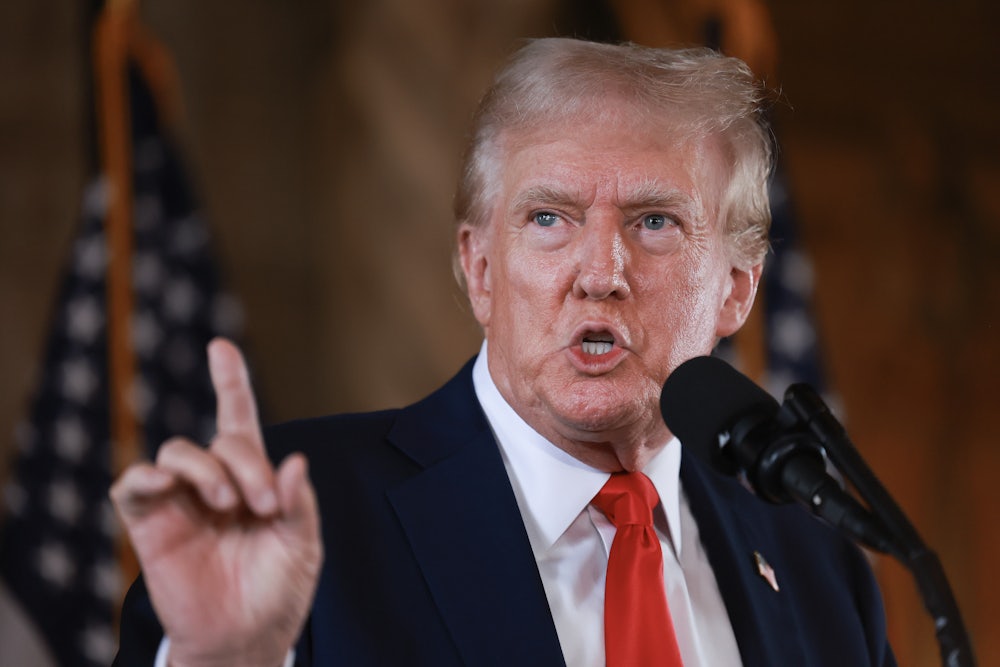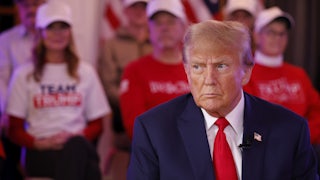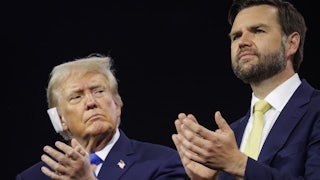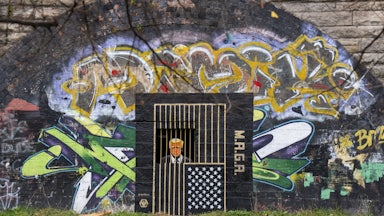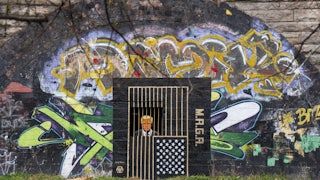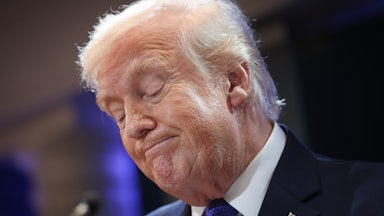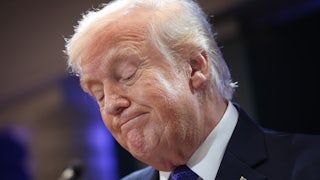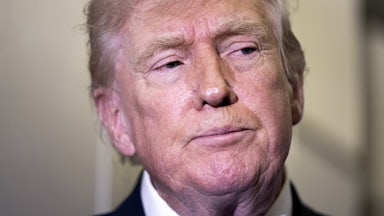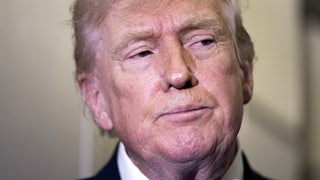News flash: Donald Trump and his presidential campaign firmly oppose foreign governments interfering in our elections via hacking, warning that any media that amplifies such ill-gotten documents would be “doing the bidding of America’s enemies.”
Such an anodyne sentiment would not ordinarily qualify as news but for the fact that a mere two presidential election cycles ago, Trump and his campaign happily did the bidding of America’s enemies by leveraging foreign leaks of hacked documents.
But this is the Trump—and Republican Party—we have grown accustomed to: They demand that Americans disbelieve their eyes and memories and swallow whatever situationally convenient bullshit suits the MAGA movement, facts and context be damned. And yet, some Americans who are supposed to be professionally immune to bullshit are among the first to fall for it: Arguably the only thing more jaw-dropping than Trump’s shameless intellectual dishonesty (which is always shocking, never surprising) is the media’s willingness to downplay if not flat-out accommodate it, as it has done with the recent Trump campaign hack.
Microsoft reported Friday that an intelligence unit of Iran’s Islamic Revolutionary Guard Corps had successfully spear-phished a “former senior adviser” to a presidential campaign, which by weekend’s end proved to be Trump’s. (The former adviser is reportedly Roger Stone, who should have known better, having trafficked in hacked emails for Trump and Russia in 2016.) Politico reported Saturday that someone identifying themself as “Robert”—not me!—and using an AOL account had for weeks “relayed what appeared to be internal communications from a senior Trump campaign official.” This “Robert” had reportedly also been in touch with The Washington Post. (The Post also reported Monday that Iranian hackers have targeted the Harris campaign, noting that thus far, “investigators have not found evidence that those hacking attempts were successful.”)
All of this prompted Trump’s campaign—presumably with a collective straight face—to issue a statement from spokesman Steven Cheung denouncing the hack as having been “obtained illegally from foreign sources hostile to the United States, intended to interfere with the 2024 election and sow chaos throughout our Democratic process,” adding: “Any media or news outlet reprinting documents or internal communications are doing the bidding of America’s enemies and doing exactly what they want.”
All Americans, I should think, would agree that we don’t want to do the bidding of America’s enemies—all Americans, that is, except the ones who worked on Trump’s first presidential campaign.
I know 2016 was an awfully long time ago—almost a decade, which in Trump years feels like several lifetimes—but one doesn’t have to dig too deeply in the memory hole to recall that Trump then took a more sanguine view of foreign interference. “Russia, if you’re listening, I hope you’re able to find the 30,000 emails that are missing [from Hillary Clinton’s personal server], I think you will probably be rewarded mightily by our press,” he said in a news conference that July. He later tried to dismiss the comment as a joke, but you know who took it seriously? Russia. On or around that day, according to a subsequent indictment from special counsel Robert Mueller, Russia started trying to find those emails.
When Russia’s hacking efforts hit pay dirt—Democratic National Committee computers, specifically—Trump and his campaign had no compunction with doing the bidding of America’s enemies by leveraging the stolen files, via Russia’s WikiLeaks cutout. They even incorporated the attempts to sow chaos throughout our Democratic process into their very campaign planning. As NBC reported in April 2019, when Mueller released his report:
Members of the 2016 Trump campaign had a series of contacts with WikiLeaks and people close to its operation regarding leaked Clinton campaign emails, even preparing a press strategy ahead of their release, according to special counsel Robert Mueller’s report.…
The report also details direct communications between the president’s son Donald Trump Jr. and WikiLeaks before the election.
So no, neither the media nor the Kamala Harris–Tim Walz campaign ought to amplify hacked Trump documents (if for no other reason than the very practical impossibility of verifying whether anything in large dumps has been altered to sow even more chaos). But please spare us the unironic repetition of Trump campaign whining about being victimized by foreign hackers and how airing what they find would be “doing the bidding of America’s enemies.” (Did I say unironic? My bad: Irony’s corpse lies in the middle of Fifth Avenue, next to Truth’s—where Trump shot them both and didn’t lose any votes.)
As a former daily reporter I tend to shy away from much media criticism, but skimming the press accounts of the Iran hack makes me wonder whether such context shouldn’t play more of a role in informing readers? The allegedly hyperliberal New York Times, for example, largely left the Trump campaign’s own history with foreign hackers to the last two paragraphs, understating what Team Trump did.
The 2016 election that Mr. Trump won was marked by similar “hack and leak” efforts after Russian hackers broke into the email accounts of top Democratic officials. Leaked emails showed the internal workings of the party and of Hillary Clinton’s campaign, and also revealed criticisms of Mrs. Clinton by aides, and a trove of them was published by WikiLeaks in the final weeks of the presidential race.
Seeking an edge then, Mr. Trump’s campaign seized on the emails—many of them from Mrs. Clinton’s campaign chair, John Podesta. “We love WikiLeaks,” Mr. Trump declared at the time.
Again, much of the media is treating the Iran hack as just an unfortunate component of modern campaigns, but if it is, then Trump has direct culpability: When Russia did it first, a mere eight years ago, it was novel. Had the U.S. political system (government and campaigns) reacted with unity and disgust, it might have become footnote and example of clumsy Russian overreach. But Trump and the GOP establishment (including Senate Republican leader Mitch McConnell, who refused to denounce Russian interference at the time, lest doing so hurt his party) embraced it. Trump’s campaign encouraged it (“If it’s what you say I love it,” were Don Jr.’s exact words) and planned around it—to their and Russia’s benefit. Trump and Russian President Vladimir Putin won in 2016, inspiring the subsequent attempts. This isn’t last-paragraph, throwaway stuff.
Such context matters, which is why Trump and the GOP so often elide it—because it can get in the way of scoring political points in the moment. And more ominously because a central, authoritarian message of Trumpism is: Who are you going to believe? Trump or your lying eyes and memories? For Trump and the GOP, the answer is Orwellian: Big Donald speaks the truth, and if reality doesn’t accord that’s reality’s problem, not Trump’s—and not yours.
It’s that instinct that underlies most of the genuinely weird and unhinged things Trump spouts. Take this message over the weekend from, again, an actual major-party nominee for president, regarding an airport rally his opponent had: “Has anyone noticed that Kamala CHEATED at the airport? There was nobody at the plane, and she ‘A.I.’d’ it, and showed a massive ‘crowd’ of so-called followers, BUT THEY DIDN’T EXIST!” The only thing here that doesn’t exist is a scintilla of sanity. The Republican nominee for president is manifesting his own massive insecurities (much more massive than his rally crowds these days) on social media and demanding that his followers believe them over reality. He would declare the moon landing false if he thought it might give him an edge.
Trump (and, it bears repeating, the rest of the GOP) is still taking advantage of the same media blind spot: a need for objectivity ad absurdum. The difference—and it’s important!—from eight years ago is that the media is no longer hesitant to call bullshit (“Former President Donald Trump falsely claimed on social media Sunday that a crowd at a Michigan rally …” was The Washington Post’s lead), but it still relays his fever swamp insanity as something akin to a both-sides policy difference. It normalizes Trumpism’s post-truth world.
I get that it’s hard to characterize this stuff without seeming to inappropriately favor one partisan side over the other. (And kudos to the reporters who try to manage it, like The Washington Post’s Aaron Blake, who characterized Trump’s airport delusion thus: “This is bonkers, even by Trump’s own conspiratorial and falsehood-laden standards.”) Trump says such insane shit so often we become inured to it, but maybe the guy who thinks Joe Biden both is semi-comatose and is going to storm the Democratic National Convention to seize back the nomination from his vice president should not himself be let anywhere near the levers of power, let alone the nuclear codes? Sometimes the duty to truth must outweigh the desire for a sense of objectivity. I am reminded of what Hunter S. Thompson wrote after Richard Nixon’s death:
Some people will say that words like scum and rotten are wrong for Objective Journalism—which is true, but they miss the point. It was the built-in blind spots of the Objective rules and dogma that allowed Nixon to slither into the White House in the first place. He looked so good on paper that you could almost vote for him sight unseen. He seemed so all-American, so much like Horatio Alger, that he was able to slip through the cracks of Objective Journalism. You had to get Subjective to see Nixon clearly, and the shock of recognition was often painful.
Trump never looked nearly as good on paper but still found the same blind spots, augmented over time by conservative carping over media bias, and himself slithered into the White House, doing more damage than Tricky Dick. And the Supreme Court rewarded him for his efforts by codifying Nixon’s old declaration that “when the president does it, that means it is not illegal.”
Even that’s not enough for Trump, our once and possibly future president, who seems to believe that when he says it, that means it’s not untrue.
